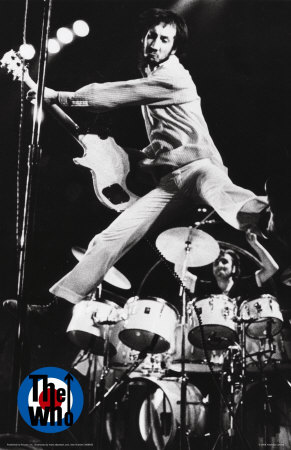
Pete Playing With The Who In 1972. His Leaps Were A Trademark Move Along With His Windmills.
Notwithstanding the scope and quality of his solo output, Pete Townshend will always be remembered as the driving force behind The Who. The fact remains that Pete always had such an attachment and belief on the band that his solo career took a long time to start in earnest. That is, his first solo releases were not really that – both “Who Came First” and “Rough Mix” were large scale collaborations, as if Pete wanted to dilute by all means the fact that he was recording with someone who was not his beloved band.
Come the early eighties, though, his one love had become quite fragmented and the will to strike out on his own was strengthened. The death of Keith Moon was the obvious catalyst, but he also found it uneasy trying to communicate to a younger public. And one of his recurrent themes was always that of youth and its connection with ideals and dreams. All he could do was study the evolution of these themes along with his already-established fan base.
He did so in his first solo disc, “Empty Glass” (1980). It would prove to be his most successful offering, although the second one (“All The Best Cowboys Have Chinese Eyes”, 1982) was also praised critically, even when it sometimes sank under its own pretensions.
Pete then released the first of many collections of demos. Those “Scoops” as he were to name them were invariably intoxicating to fans, for two reasons. The first was that Pete played every instrument himself, and he did so suiting the style of each member of The Who. The second was that his vocal delivery was always very removed from that of Roger, not only in terms of range but mainly in terms of interpretative force. Roger was always a ballsy performer, and his energy was to take some songs such as “Who Are You” into territory different to the one Pete had originally conceived.
After the first scoop was issued (1983), Pete began immersing himself in heavy conceptual work. His releases became more elaborate, and also less appealing to the average Joe. He was to craft the album and film “White City” (a record that tackled suburban issues and tensions), the musical “The Iron Man” (based on the popular children’s tale by Nobel laureate Ted Hughes) and the CD-play “Psychoderelict” (1993). Each one sold less that the previous offering. And at the end of the century, he was to (finally) issue the problematic “Lifehouse” as a four-CD boxed set.
Personally, I don’t think that his music could be enjoyed half as much by someone who has no inkling on The Who’s oeuvre. My take is that as a solo artist he expanded on some of the main themes he had previously touched upon, and he dug deeper into these aspects that deserved a treatment that were not suitable for his band. Look at the way he studies/crucifies the industry on “Psychoderelict”, for example. Or the way he slams critics on the song “Jools & Jim” from “Empty Glass”. When writing for The Who he had taken a more middle-of-the-road stance, and his own songs about the music industry revolved around the fan-performer relationship like “The Punk And The Godfather” and “New Song”. Once he launched his solo career, he went ahead either because he knew he was not dragging anybody with him, or because it was the natural step to take.

A Recent Picture Of Pete
I also think that his albums have to be experienced chronologically, as Pete gradually treads more and more mature ground. And that chronology begins with The Who, and it continues in their latest releases – both “Endless Wire” and the forthcoming “Floss” are little else than solo Pete albums in which Roger Daltrey sings the songs.
Pete is certainly someone you want to become familiar with. And even though he has claimed that now he is embarrassed by all the things he used to do and say when he was younger, the truth is these are the things that give us the key to understanding his true artistic successes. Some of these later triumphs might be too circumscribed, granted, but they all speak quite directly to the ones who believe in the power of music.
Ultimately, the phrase that inspired one of his most successful solo radio hits still gives us a true representation of his musical aim: “To prepare a face to face a million faces”. In Pete’s hands, Rock & Roll becomes a true language. Each and every note is a word. Now, will he ever manage to strike the lost chord he has been seeking ever since the early 70s? I am not sure. But I am sure that if someone does find that definitive chord, it is going to be him.

Nice article. I agree about the demo’s – those are some of my favorite Pete recordings. I have always loved Pete’s voice, on his own, as well as juxtaposed against Roger’s in songs like Baba O’Riley, Bargain, Sister Disco, The Punk Meets the Godfather, etc.
I thought Pete did some great work on the recent “Who” album, “Endless Wire”. It was more like a solo record, with Roger as guest vocalist.
there once was a note….
Thank you so much, after checking out your blog I can see that you have met Pete
Townshend in person. That’s so amazing!
The Who is one of these bands I absolutely adore. I became acquainted
with them and their music when I was younger and not in the best shape myself.
Now “I love every minute of the day” ; )
I hope they tour South America when they release “Floss”!
Best,
Emilio
Pingback: Who Came First (Pete Townshend) – Album Review (Part 1) | MusicKO
Pingback: Month In Review – January 2010 | MusicKO
Pingback: DemoHero – A Community Site Devoted To Demo Recordings | MusicKO
Pingback: Jump Up! (Elton John) – Album Review | MusicKO
Pingback: The Traveling Wilburys Vol. 3 – Album Review | MusicKO
Pingback: The Kinks – General Introduction | MusicKO
Pingback: Thunderfingers: The Best Of John Entwistle | MusicKO
Pingback: RostbiF Releases A New EP – Listen To It Online For Free! | MusicKO
Pingback: The Top Artists Of 2010 On Last.fm | MusicKO